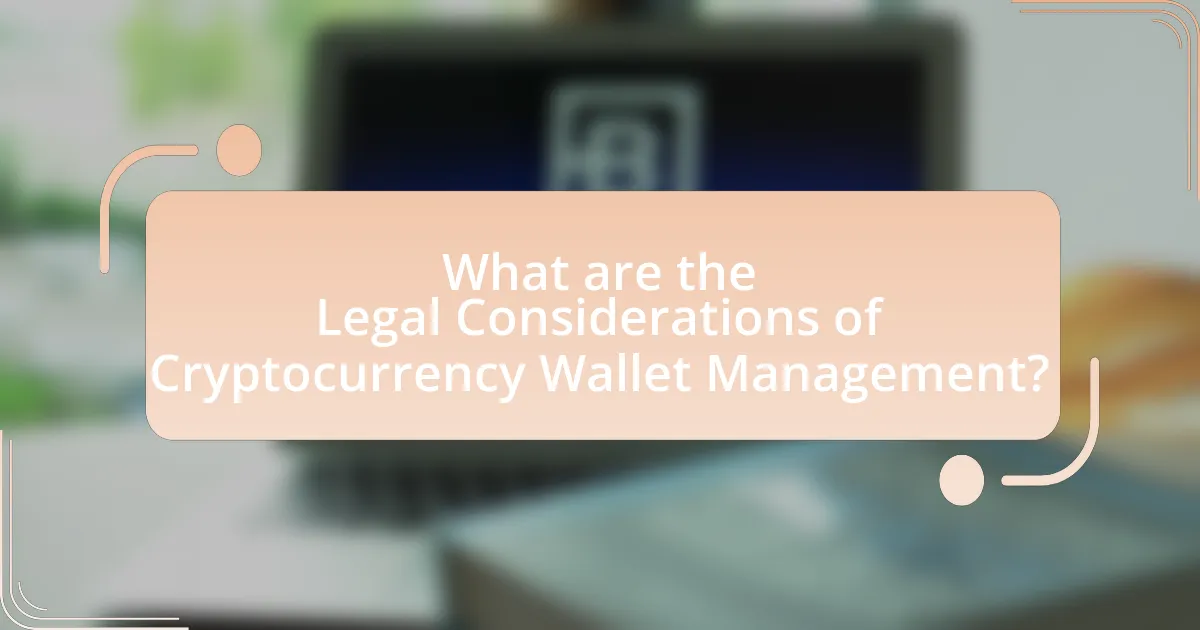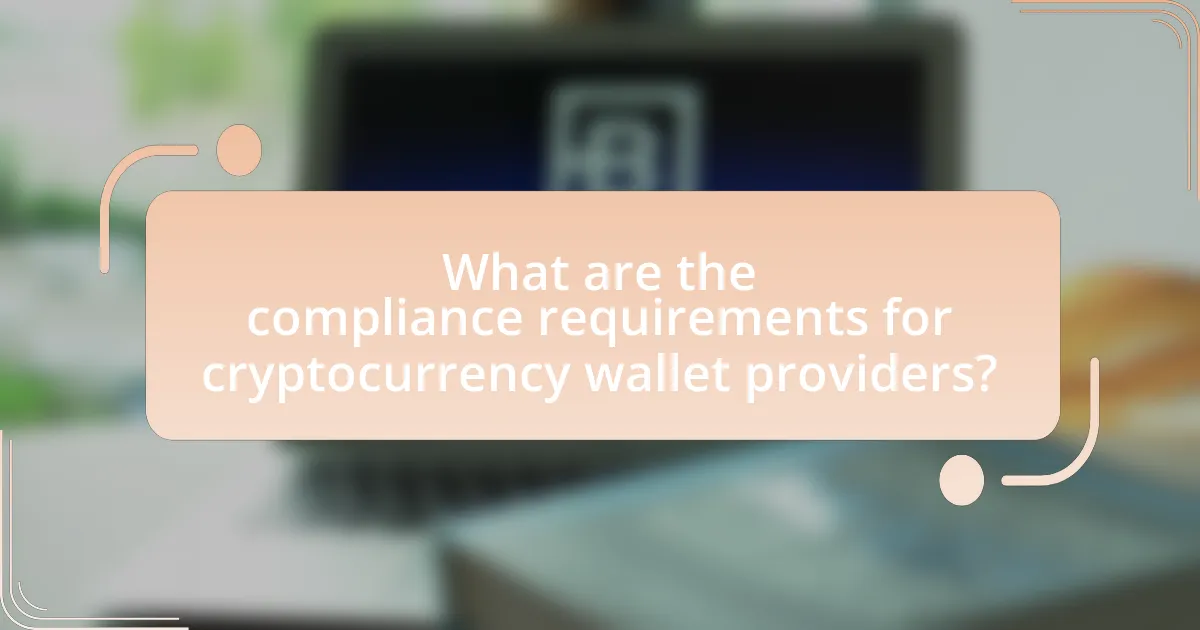The article focuses on the legal considerations of cryptocurrency wallet management, emphasizing the importance of compliance with anti-money laundering (AML) and know your customer (KYC) regulations, as well as data protection laws. It outlines how these regulations impact wallet providers, detailing specific laws governing cryptocurrency wallets across various jurisdictions, including the United States, European Union, and Japan. The article also addresses the legal risks associated with improper wallet management, potential liabilities, and best practices for users to protect themselves from legal issues. Additionally, it highlights the role of regulatory bodies in defining cryptocurrency wallets and the compliance requirements that wallet providers must follow to ensure legal operation.

What are the Legal Considerations of Cryptocurrency Wallet Management?
The legal considerations of cryptocurrency wallet management include compliance with anti-money laundering (AML) and know your customer (KYC) regulations, as well as data protection laws. Cryptocurrency wallet providers must ensure they adhere to these regulations to prevent illicit activities and protect user data. For instance, in the United States, the Financial Crimes Enforcement Network (FinCEN) requires cryptocurrency exchanges and wallet services to register as money services businesses (MSBs) and implement AML programs. Additionally, the General Data Protection Regulation (GDPR) in the European Union mandates that companies handling personal data must ensure its security and privacy, impacting how wallet providers manage user information. Failure to comply with these legal frameworks can result in significant penalties and legal repercussions.
How do regulations impact cryptocurrency wallet management?
Regulations significantly impact cryptocurrency wallet management by imposing compliance requirements that wallet providers must adhere to. These regulations often include Know Your Customer (KYC) and Anti-Money Laundering (AML) protocols, which require wallet providers to verify the identities of their users and monitor transactions for suspicious activity. For instance, the Financial Action Task Force (FATF) has issued guidelines that recommend countries implement these measures, leading to increased scrutiny and operational costs for wallet providers. Consequently, non-compliance can result in severe penalties, including fines and loss of operating licenses, thereby influencing how wallets are managed and operated in various jurisdictions.
What specific laws govern cryptocurrency wallets in different jurisdictions?
Cryptocurrency wallets are governed by various laws that differ significantly across jurisdictions. In the United States, the Financial Crimes Enforcement Network (FinCEN) classifies cryptocurrency wallet providers as money services businesses (MSBs), requiring them to comply with anti-money laundering (AML) regulations. In the European Union, the Fifth Anti-Money Laundering Directive (5AMLD) mandates that wallet providers register and adhere to AML and counter-terrorism financing (CTF) measures. In Japan, the Payment Services Act regulates cryptocurrency wallets, requiring registration with the Financial Services Agency (FSA) and compliance with consumer protection laws. In contrast, countries like China have imposed strict bans on cryptocurrency transactions, affecting wallet operations. These laws reflect the varying regulatory approaches to cryptocurrency wallets globally, emphasizing the need for compliance with local regulations.
How do regulatory bodies define cryptocurrency wallets?
Regulatory bodies define cryptocurrency wallets as digital tools that allow users to store, send, and receive cryptocurrencies. These wallets can be categorized into two main types: hot wallets, which are connected to the internet, and cold wallets, which are offline storage solutions. For instance, the Financial Action Task Force (FATF) emphasizes that wallets facilitate the management of private keys, which are essential for accessing and controlling cryptocurrency assets. This definition aligns with the need for regulatory compliance, as wallets are often subject to anti-money laundering (AML) and know-your-customer (KYC) regulations to prevent illicit activities.
What are the legal risks associated with cryptocurrency wallet management?
The legal risks associated with cryptocurrency wallet management include regulatory compliance failures, potential fraud, and issues related to data privacy. Regulatory compliance failures arise from the evolving legal landscape surrounding cryptocurrencies, where non-compliance with anti-money laundering (AML) and know your customer (KYC) regulations can lead to significant penalties. For instance, in 2021, the Financial Crimes Enforcement Network (FinCEN) imposed fines on several cryptocurrency exchanges for failing to adhere to these regulations. Additionally, the risk of fraud is prevalent, as inadequate security measures can lead to unauthorized access and theft of funds, which may not be recoverable under current laws. Lastly, data privacy issues can arise from the mishandling of personal information, potentially violating laws such as the General Data Protection Regulation (GDPR) in Europe, which imposes strict guidelines on data protection and privacy.
What potential legal liabilities can arise from improper wallet management?
Improper wallet management can lead to several potential legal liabilities, including loss of funds due to negligence, regulatory violations, and exposure to fraud. Negligence in securing private keys or failing to implement adequate security measures can result in unauthorized access and loss of assets, which may lead to civil lawsuits from affected parties. Additionally, non-compliance with anti-money laundering (AML) and know your customer (KYC) regulations can result in fines and legal actions from regulatory bodies, as seen in cases where cryptocurrency exchanges faced penalties for inadequate compliance. Furthermore, if a wallet is used to facilitate fraudulent transactions, the owner may be held liable for facilitating illegal activities, leading to criminal charges.
How can users protect themselves from legal issues related to wallets?
Users can protect themselves from legal issues related to wallets by ensuring compliance with local regulations and maintaining accurate records of transactions. Compliance involves understanding the legal framework governing cryptocurrency in their jurisdiction, which may include registration requirements, tax obligations, and anti-money laundering laws. Accurate record-keeping of all transactions, including dates, amounts, and involved parties, can provide essential documentation in case of audits or legal inquiries. Additionally, users should utilize wallets that prioritize security and privacy, as this can mitigate risks associated with unauthorized access or data breaches, which may lead to legal complications.

What are the compliance requirements for cryptocurrency wallet providers?
Cryptocurrency wallet providers must comply with anti-money laundering (AML) and know your customer (KYC) regulations. These requirements mandate that wallet providers verify the identities of their users, monitor transactions for suspicious activity, and report any findings to relevant authorities. For instance, in the United States, the Financial Crimes Enforcement Network (FinCEN) classifies cryptocurrency wallet providers as money services businesses (MSBs), which subjects them to federal AML regulations. Additionally, many jurisdictions require compliance with data protection laws, such as the General Data Protection Regulation (GDPR) in the European Union, which governs the handling of personal data.
How do Anti-Money Laundering (AML) laws affect wallet management?
Anti-Money Laundering (AML) laws significantly impact wallet management by imposing regulatory requirements on cryptocurrency service providers to verify user identities and monitor transactions. These laws mandate that wallet providers implement Know Your Customer (KYC) procedures, which require the collection of personal information from users to prevent illicit activities such as money laundering and terrorist financing. For instance, the Financial Action Task Force (FATF) guidelines recommend that virtual asset service providers, including wallet operators, conduct due diligence on their customers and report suspicious transactions to authorities. Compliance with AML regulations can lead to increased operational costs for wallet management, as providers must invest in technology and processes to ensure adherence to these legal standards.
What are the reporting obligations for wallet providers under AML regulations?
Wallet providers are required to comply with Anti-Money Laundering (AML) regulations by implementing customer due diligence (CDD) measures, monitoring transactions, and reporting suspicious activities. Specifically, they must identify and verify the identity of their customers, maintain records of transactions, and report any transactions that appear to involve proceeds of crime or are otherwise suspicious to the relevant authorities, such as financial intelligence units. These obligations are outlined in various jurisdictions’ AML laws, which aim to prevent money laundering and terrorist financing activities. For instance, the Financial Action Task Force (FATF) provides guidelines that many countries adopt, emphasizing the importance of these reporting obligations for financial institutions, including wallet providers.
How can wallet providers ensure compliance with AML laws?
Wallet providers can ensure compliance with Anti-Money Laundering (AML) laws by implementing robust Know Your Customer (KYC) procedures. These procedures involve verifying the identity of users through government-issued identification and other relevant documentation, which helps to prevent illicit activities. Additionally, wallet providers should monitor transactions for suspicious activity, maintain detailed records of user transactions, and report any suspicious transactions to the relevant authorities, as mandated by AML regulations. Compliance with these practices is essential, as regulatory bodies worldwide, such as the Financial Action Task Force (FATF), emphasize the importance of AML compliance in the cryptocurrency sector to mitigate risks associated with money laundering and terrorist financing.
What role does Know Your Customer (KYC) play in wallet management?
Know Your Customer (KYC) plays a critical role in wallet management by ensuring compliance with regulatory requirements and enhancing security measures. KYC processes involve verifying the identity of users, which helps prevent fraud, money laundering, and other illicit activities associated with cryptocurrency transactions. For instance, according to the Financial Action Task Force (FATF), implementing KYC protocols is essential for financial institutions to mitigate risks related to criminal activities. By requiring users to provide identification and personal information, wallet providers can create a safer environment for transactions and maintain the integrity of their platforms.
What are the KYC requirements for cryptocurrency wallet users?
KYC requirements for cryptocurrency wallet users typically include providing personal identification information such as a government-issued ID, proof of address, and sometimes a selfie for verification. These requirements are mandated by regulatory bodies to prevent money laundering and fraud. For instance, the Financial Action Task Force (FATF) recommends that virtual asset service providers implement KYC measures to ensure compliance with anti-money laundering (AML) regulations. This means that users must verify their identity before they can fully access wallet services, ensuring a secure and compliant environment for cryptocurrency transactions.
How do KYC processes vary across different jurisdictions?
KYC processes vary significantly across different jurisdictions due to differing regulatory frameworks and compliance requirements. For instance, in the European Union, the Anti-Money Laundering Directive mandates stringent KYC measures, requiring financial institutions to verify customer identities and assess risks, while in the United States, the Bank Secrecy Act imposes similar obligations but allows for more discretion in implementation. Additionally, jurisdictions like Singapore have adopted a risk-based approach, enabling firms to tailor their KYC processes based on the perceived risk of their clients. These variations are influenced by local laws, cultural attitudes towards privacy, and the level of financial crime risk, demonstrating that KYC compliance is not uniform globally.

What best practices should users follow for legal cryptocurrency wallet management?
Users should follow best practices such as ensuring compliance with local regulations, using secure wallets, and maintaining accurate records for legal cryptocurrency wallet management. Compliance with regulations involves understanding the legal framework governing cryptocurrency in the user’s jurisdiction, which can include anti-money laundering (AML) and know your customer (KYC) requirements. Utilizing secure wallets, such as hardware wallets, protects assets from hacking and theft, as these wallets store private keys offline. Additionally, maintaining accurate records of transactions and wallet addresses is crucial for tax reporting and legal accountability, as it helps users demonstrate compliance with tax obligations and provides a clear audit trail.
How can users ensure their wallets comply with legal standards?
Users can ensure their wallets comply with legal standards by conducting thorough research on the regulatory requirements specific to their jurisdiction. This includes understanding anti-money laundering (AML) and know your customer (KYC) regulations, which vary by country. For instance, in the United States, the Financial Crimes Enforcement Network (FinCEN) mandates that cryptocurrency wallet providers register as money services businesses (MSBs) and implement KYC procedures. Additionally, users should utilize wallets that are compliant with these regulations, often indicated by their licensing and operational transparency. Regularly reviewing updates from regulatory bodies and consulting legal experts can further help users maintain compliance with evolving legal standards.
What steps should users take to verify the legality of their wallet provider?
Users should take the following steps to verify the legality of their wallet provider: first, check if the provider is registered with relevant regulatory authorities in their jurisdiction, such as the Financial Crimes Enforcement Network (FinCEN) in the United States or the Financial Conduct Authority (FCA) in the UK. This registration indicates compliance with local laws and regulations.
Next, users should review the provider’s terms of service and privacy policy to ensure transparency regarding user rights and data handling practices. Additionally, users can look for third-party audits or certifications that demonstrate the provider’s adherence to security and operational standards.
Finally, researching user reviews and feedback on reputable forums can provide insights into the provider’s reputation and any legal issues they may have faced. These steps collectively help users ascertain the legitimacy and legal standing of their wallet provider.
How can users stay informed about changes in cryptocurrency regulations?
Users can stay informed about changes in cryptocurrency regulations by regularly following reputable financial news outlets, subscribing to industry newsletters, and monitoring updates from regulatory bodies such as the Financial Action Task Force (FATF) and the U.S. Securities and Exchange Commission (SEC). These sources provide timely information on regulatory developments, ensuring users are aware of any legal changes that may affect their cryptocurrency activities. For instance, the SEC frequently publishes updates on its website regarding new regulations and enforcement actions, which can directly impact cryptocurrency users.
What common mistakes should users avoid in wallet management?
Users should avoid common mistakes such as neglecting security measures, failing to back up wallet data, and not keeping software updated. Neglecting security measures, like using weak passwords or not enabling two-factor authentication, increases vulnerability to hacks; according to a report by Chainalysis, over $3.2 billion was lost to hacks in 2020 alone. Failing to back up wallet data can lead to irreversible loss of funds if the device is lost or damaged, as many users have reported losing access to their wallets permanently. Not keeping software updated can expose users to known vulnerabilities, as outdated software may lack critical security patches, making it easier for attackers to exploit weaknesses.
What are the pitfalls of neglecting legal considerations in wallet management?
Neglecting legal considerations in wallet management can lead to significant financial and legal repercussions. Wallet managers may face penalties for non-compliance with regulations such as anti-money laundering (AML) and know your customer (KYC) laws, which can result in hefty fines or even criminal charges. For instance, in 2021, the Financial Crimes Enforcement Network (FinCEN) imposed a $60 million penalty on a cryptocurrency exchange for failing to implement adequate AML measures. Additionally, neglecting legal aspects can expose users to fraud, loss of assets, and lack of recourse in disputes, as legal protections may not apply without proper compliance. Therefore, understanding and adhering to legal requirements is crucial for safeguarding assets and ensuring operational legitimacy in cryptocurrency wallet management.
How can users effectively manage their wallets to minimize legal risks?
Users can effectively manage their wallets to minimize legal risks by ensuring compliance with local regulations and maintaining accurate records of transactions. Compliance involves understanding and adhering to laws regarding cryptocurrency usage, such as anti-money laundering (AML) and know your customer (KYC) requirements, which vary by jurisdiction. Accurate record-keeping of all transactions, including dates, amounts, and involved parties, helps in demonstrating transparency and can be crucial during audits or investigations. Additionally, utilizing wallets that offer enhanced security features, such as two-factor authentication and encryption, reduces the risk of unauthorized access, which can lead to legal complications.